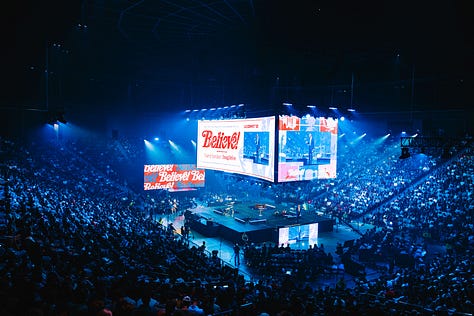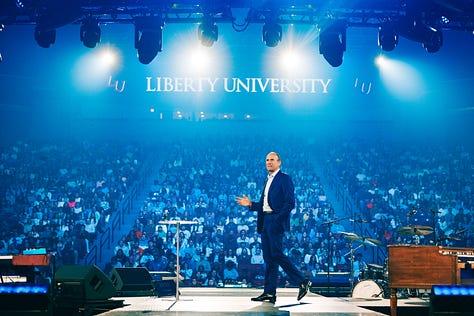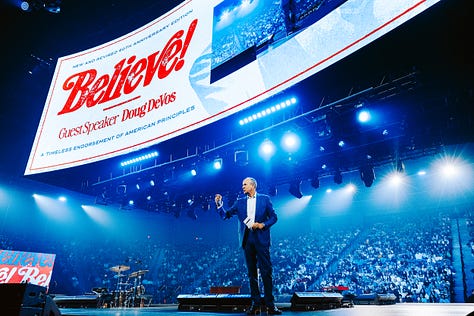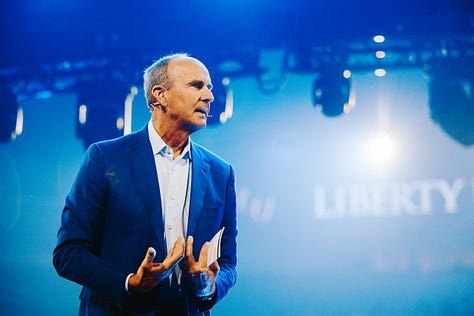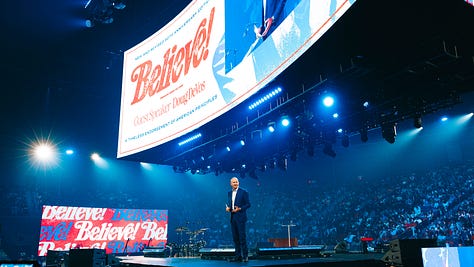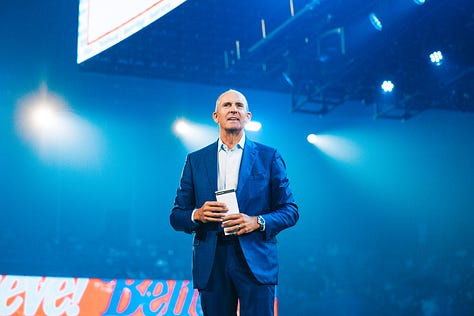You Bring the Cookies
A Call to Courage, Conviction, and Action
On October 17, 2025, I had the honor of speaking to thousands of students at Liberty University’s Convocation series, with thousands more streaming online. I shared a message about courage, conviction, and calling—challenging this new generation to help shape America’s future through faith in action. Drawing from my father Rich DeVos’s classic Believe!—now being re-released for its 50th anniversary—and from my own reflections written for the edition, I explored how belief becomes behavior through atmosphere, attitude, and action. It’s a reminder that what we truly believe determines how we live—and how we lead.
[Read the full transcript and view the live experience on YouTube below.]
Originally delivered at Liberty University Convocation on October 17, 2025.
It’s a tremendous honor to have a chance to be here with all of you and to share a few thoughts today. You know, I’ve never been here before. When I arrived yesterday, I felt this sense that I was home. You know, we at Amway, we talk about freedom, family, hope, and reward. And when we would have executives come in to think about joining us, we would say to them, if you saw those words and you walked in here and you said, “These guys seem weird,” this might not be the place for you. But if you saw those words and you walked in here and you said, “I feel home,” then this is the place for you. And when I see the words of being champions for Christ, this is the place for me. And I’m grateful to be here with all of you.
Now, I will say it was very unfair to have my daughter introduce me, so I’m doing really good not to cry right now as we go through that. But it’s also unfair to have Bill and Gloria Gaither here as we honor them. Bill and Gloria, you have meant so much. We are so grateful for you and all you’ve done for the cause of Christ. Thank you, once again, let’s celebrate Bill and Gloria Gaither. What a joy. What a special opportunity for them to be here.
Well, there’s a few things I want to talk about with you today and share with you. But the first thing I want to do is tell you a little story. In the Amway business, we’re in sales, direct selling. And there’s an old story of my father and his business partner, Jay Van Andel. When they started the Amway business, they would do the normal sort of sales thing: you’d bring people together in the evening, have coffee and cookies, talk about the sales you had that last week, share notes and do these sorts of things. That was a regular occurrence for them.
They recognized that as they did that, there was a gentleman who came regularly, faithfully, but never had any sales to report, never had any activity that he had done. After a while, week after week, they went back to him and said, “You keep coming on a regular basis, but you’ve never done anything. Why do you keep coming back?” And he said, “I like the cookies.” And they said, “Well, that’s great, that’s wonderful. But next week, you bring the cookies.” And they never saw him again.
It’s an interesting way in life, isn’t it? Sometimes when you’re called and asked to do something, you can either rise to the occasion or you can kind of back away. So I want to spend some time talking today about how you are rising and going to rise to the occasion. I want to talk about America’s future, and I want to talk about your role in it. The reason I want to talk about it is because you have the opportunity, you have the ability, to shape it. Being a champion for Christ means you’re going to have, like your mission statement says, impact in this world and that you’re going to do something with this opportunity you have before you. And I want to make sure we spend some time going through what that could be, what that could look like, and maybe how to think about it.
You’re going to get a book entitled Believe, and my father wrote it 50 years ago. I did some introductions. We’re rereleasing it, you see it on the screen, and it comes from this simple idea: what you believe, when you truly believe it, are the things you start to express in your life. And if we’re talking about America’s future, and if we’re talking about your role in shaping it, it starts with the foundation of what you believe.
Now, it is not lost on me that Charlie Kirk was supposed to be here next week, and we know Charlie’s home with the Lord. But he was a tremendous example of expressing what he believed. Not all of us are going to do it the way he did it. He’s a wonderful example, but not all of us are going to do it the way he did it. We all have our own ways of expressing our belief. But we are strong in the idea that when we have something that we believe in, we want to exhibit behavior that’s consistent with that belief. We want to do something that demonstrates that this is what we believe, not for show, but from our heart, from the inside, because it’s true.
I had a mentor and friend, an evangelist, that I grew up with, actually, he led me to the Lord, and our family had a great time that we were together. Dad said, “You got to talk to Uncle Z,” a guy named Billy Zeoli from Grand Rapids, Michigan. Some of you may know that President Gerald Ford was from Grand Rapids, Michigan. Billy became kind of a chaplain for President Ford to help him put things in place as he served in what was a very difficult time in our nation’s history.
He told me a story once of one of the unique opportunities he had. He was in Israel with the prime minister, Menachem Begin. Billy is an evangelist for the cause of Christ, a great friend of Dr. Jerry Falwell. They were having lunch together with Menachem Begin, and the prime minister says, “Reverend, you pray, you pray the blessing.” Billy thought about it a second. He tried to think of all the Old Testament names and stories he could bring up in the middle of his prayer, and he had what he thought was a really nice prayer. And then he ends with, “In Jesus’ name, amen.”
The prime minister goes, “I knew you were going to do that. I knew it.” He smiled and laughed and said, “And I wouldn’t have respected you if you hadn’t.” People respect you when you express the genuine belief that you have in your life. People see that, and then they want to follow.
So I want to spend a little time talking about a way to frame some thinking for you as you go forth and live as a champion for Christ, and as you shape our country and indeed our world in the time that God gives you in your lifetime. I want to put it into three categories: atmosphere, attitude, and action.
Atmosphere
Atmosphere is why you came here. You came here because you wanted to be in a place like this. You made a decision to be here, and all of us are in times and places we have to respect to put the work we’re doing in context. One of the main things I want to keep for all of us to put in context is that this is God’s world. It’s always been God’s world. It will always be God’s world. And we have a chance to be part of His creation. How much more fun can we have in life when we’re in that position?
I always enjoy reading Acts and thinking about the first-century church, wishing I had the same conviction or courage that those early apostles did. Early in Acts, after they received the Holy Spirit, they preached powerfully, they healed people. The Jewish leaders of the day would continue to bring them in, arrest them, try to stop them, and they kept going back to the temple, healing, helping, saving, and spreading the good news of the Gospel of Jesus Christ.
“If their purpose or activity is of human origin, it will fail. But if it is from God, you will not be able to stop these men; you will only find yourselves fighting against God.” Acts 5:38–39
I take that as encouragement. Because of our commitment to Christ, we are not operating from a foundation or a belief of human origin. We are operating from the foundation of the Creator of our universe and the Creator of each and every one of us, so we can go forward in confidence. That is the atmosphere in which we are operating today. We know there are still people persecuting Christians all around the world, just like then. But we serve a God who created this world. In the first-century church, those apostles knew, He lived, died, rose again from the dead, is alive today with us, and will come back to us at some point. That’s where we live today. That’s the context in which we can go forward in confidence and with courage.
We live in a country where we have opportunities as well, great things in the foundation and formation of our country. I serve as the chair of the National Constitution Center in Philadelphia. On one of my early trips there, we went to Independence Hall with Ranger Terry Brown. As we looked at the paintings, he asked our tour group, “Do you know these people?” We said no. He was disgusted that we didn’t know our nation’s history. He told the story of George Washington, how he willingly gave up power. If you’ve seen Hamilton, you know the King of England’s reaction: “I didn’t know that was something someone could do.”
As I’ve learned, and as the CEO of the National Constitution Center wrote in his book, when he talks about “the pursuit of happiness” in our Declaration, it was not happiness to feel good. The idea of happiness was to be good, to live a virtuous life, to stand strong on your faith.
These two pieces come together. We live in a world God created and continues to control. We know it’s not the way He intended it originally, it will be. And in this time, we have work to do. Think about the atmosphere you’re in and the atmosphere you’re going to be in as you leave this place, your career, your work, your ministry, whatever it may be. Think about where you put yourself. Make that choice. If it’s not the right spot, move. Change. Do something different. Create the right spot. If you’re there, do something so it is the right atmosphere for you to be the most productive you can be.
Attitude
Let’s really challenge ourselves with the way we think. My father suffered from heart disease for many, many years. For a long time, it was always touch and go, whether a phone call from Mom and Dad would be just “Hey, how are you doing?” or “Something’s gone wrong.” But every morning in their devotions, they would read from Philippians 4
“Rejoice in the Lord always. I say it again: rejoice.” — Philippians 4:4
“Whatever is true, whatever is noble, whatever is right, whatever is pure, whatever is lovely, whatever is admirable—if anything is excellent or praiseworthy—think about such things.” — Philippians 4:8
By their example, my mom and dad would always think positively about the condition he was in. He would challenge himself to think about a good future, that he was going to continue to contribute, to see his kids and grandkids grow up. He would challenge his mind. But Satan is always in a battle for our minds, trying to get a way in, to have us think something wrong, think something bad, lose trust in somebody next to us, and especially lose trust and faith in God. We have to be responsive.
A couple of ideas:
First, from a book called Everyday Survival by Laurence Gonzales. Not necessarily a Christian book, but insightful about how our brains work, how we were created. Our brains process information rapidly so we don’t have to relearn things as we age. I can say, “That’s a camera, that’s a TV, these are seats. I’m in an auditorium.” I don’t have to ask if a camera is an airplane or a car. We’re great at it. That’s how our brains were made, to process information. It’s so good that routines form we don’t even think about, like tying your shoes. But those scripts can become so powerful that we don’t accept new information.
He used the example of the 2004 tsunami in Asia. People were on vacation. The brochure said it was safe; they were happy. When the sea went out and fish flopped on the bottom of the bay, they just stood there. They didn’t take in the information that they were in danger. And as those terrible videos show, many were washed away and killed.
It’s easy to do. It happened to me. I like to sail. I’ve been doing it a long time; I think I’m pretty good at it. I was at our cottage. Nice afternoon. I’d finished my calls and thought, “I’m going to take a sailboat ride.” My wife was gone, I was alone. I went out for a quick sail, hardly anyone on the lake. I’ve done it a thousand times. The first thing you always have to remember on a boat is: look around so you don’t hit another boat, which I didn’t do.
Pictures look good, didn’t they? I’m a pretty good sailor; I’ve been doing this for a while. But when you put the sail up, you can’t see through it. I didn’t work hard enough to look around it. When a boat sailed across my bow, really close, I stopped for a second because I couldn’t believe it. I wasn’t willing to accept that new information until I hit him. Luckily, sailboats go pretty slow. It was a glorified parking-lot accident, nobody got hurt. But boy did I feel stupid. It’s a real example. It can happen to all of us if we forget to take in new information.
That’s why, when we talk about America’s future, we look to you, the next generations. You don’t know what’s impossible yet. Old people like me say, “I don’t know if you could do that, that’s too hard, you won’t be able to accomplish it.” You don’t know that yet. You can take in new information far better than others can. And when others tell you that you can’t do it, don’t believe them. Keep thinking. Keep dreaming. You can never dream bigger than God. Continue to think about what you can do, the impact you can have. Continue to work and think about being that champion for Christ. That’s the opportunity you have.
Second, an idea called “collective illusion,” from Todd Rose’s book Collective Illusions. In the early days of social science, a pioneer moved to a small town to study it. His research found that in this town, nobody smoked, drank, or played cards, because that’s what all the research said. But he lived there, and he knew that everybody smoked, drank, and played cards, they just wouldn’t say it on the survey. What happened is they began to believe that nobody else did, and they were unwilling to connect their personal reality with what they would say.
There was a wonderful woman at the church who believed people shouldn’t smoke, drink, or play cards. She was strong in her faith and prominent in the community. Out of respect, that’s what everybody said. But that’s not what they did. The point, and we see it through surveys and social media, is that a small group can be very loud. It looks big; it looks like everybody’s doing it. Because we’re wired to fit in and want to be part of something, we’ll buy into that lie.
The book gives countless examples of how surveys would say one thing, but actual behavior would say something else. It’s important to keep those aligned. Most of the examples he learned were of a small group of people trying bad things, making us all want to say doing bad things is okay, “come along with the crowd.” But that can be turned around when we find our voice. When we talk about the Gospel, when we talk about being champions for Christ, when we’re loud and powerful, people will follow us too.
That’s the key and the opportunity we have: be strong in our thinking, understand there are new ways to be champions for Christ, understand there’s new information we can gather. You’re here at a university of discovery. You’re learning new things regularly, new thought, new ideas, new ways to be champions. Think about these things. Think about these things.
Action
How do we turn it into action? We’ve seen a desire, especially among younger people, to have purpose and meaning in their lives, to live a life founded on their beliefs, to live with courage to express those beliefs and say, “This is what I believe.”
Many times when our family was in Florida, we attended Coral Ridge Presbyterian Church with Dr. James Kennedy. One of the things at every service was to read the Apostles’ Creed. In his big booming voice, he would say, “Christian, what do you believe?”
“I believe in God the Father Almighty, Maker of heaven and earth.” — The Apostles’ Creed
We would repeat the Apostles’ Creed.
We have the opportunity to take action, to live lives of courage, to express our beliefs in appropriate and great ways, to attract people, to help them see and realize the purpose and meaning you have that can be shared with them, so that they too can live a purposeful, meaningful life.
So, as we talk about this stage, I go back to Romans 12. My continual prayer is,
“Lord, how do I continue to serve you? What do I do?”
“We have different gifts, according to the grace given to each of us.”
Romans 12:6
I think we all have that. Romans says it takes all of us. What’s your gift? Your talent? Your skill? Your passion? You are part of the body of Christ. Because you do it a little differently than somebody else, you are still a champion for Christ. You can do it in your workplace, your family, your community, wherever you may be. You can take action to impact somebody else’s life: have a cup of coffee, invite someone to dinner, talk to them when they’re having a tough time. You can step forward and change the world by establishing a relationship, one person at a time. Think about that. You have that power because God is living in you and using you in that way.
But God has also given us an incredible opportunity to choose, to do it, or not. We can take action and we can bring the cookies, or we can just fade away.
When we would talk about the Amway business, one of the first things Dad and Jay always believed was that people would want to have a bigger income or a business of their own. They saw this opportunity, and some would do something with it. That’s the same opportunity we have today to be a champion of Christ. You’re here, are we going to do something with it?
A number of years ago, my father was at a university graduation, around 2009
Some of you remember that time frame, an awful economic time in our country and around the world. Most of the speakers spent their time talking about how difficult it was: “You’re graduating in a tough market, tough environment. Hard to find a job. Hard to do things. Really bad out there. Be careful.” Complete doom and gloom. At a graduation.
My father got up afterwards. He looked at everybody and said, “Don’t listen to all those people. Don’t listen to them. If you can’t get a job, do something else. Go to work for yourself. Start a business. Be creative. Be entrepreneurial. Do something different. You’ll figure it out.” Because it doesn’t matter if it’s a good time or a bad time. It doesn’t matter. Now is the only time you have. Now is the only time you have.
Atmosphere. We live in a world where God is still in control. Attitude. How do we think about the opportunities and knowledge presented to us? Action. Do we have the courage to express our beliefs in difficult times, when people may not be responsive, when persecution like the first century is still alive and well? Are we going to have the courage to step up and step out, to make that decision to be that champion for Christ?
Our country, this university, your family, your friends, they’re all counting on you. They’re counting on you because they know the substance of your character, the learning and experiences you are having here right now. They know the depth of your convictions and the strength of your belief. And they’re counting on you to have the courage to go forth and be a champion for Christ. They’re counting on you, with the opportunities ahead of you, to do something with it, to take a step forward, to reach out, and help others understand that there’s a God who loves them, who created them; that they have purpose and meaning in their life every day; and that they can live as champions as well, in the light and not in the dark.
And I know that as we continue to work together and be together and learn together, as we move forward from this place, that together we won’t let them down. Together, we can secure America’s future and make it better. Together, we can shape the environment in which others live and grow, so that they too can know Jesus Christ as their Lord and Savior. And I know that if we do this together, we won’t let them down.
Thank you, everybody. Thanks for the time to be with you. We’ll see you later. God bless you all.
